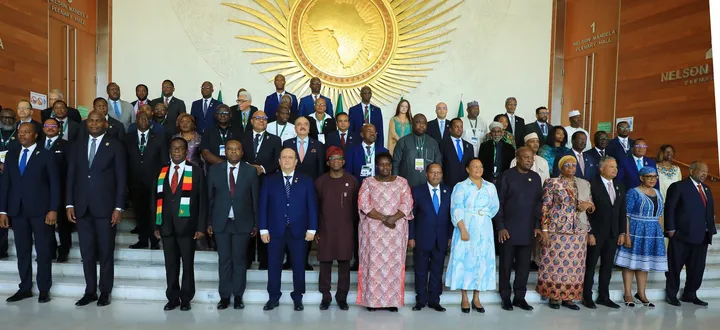By Abhishek G Bhaya
The 19th G20 Leaders' Summit is set to take place in Rio de Janeiro on November 18 and 19, 2024, bringing together leaders from the 19 member countries, the European Union (EU), and, for the first time as a permanent member, the African Union (AU).
This expanded membership underscores the forum’s growing recognition of Africa’s importance in global governance.
Yet, despite the AU’s inclusion, the intergovernmental forum is still referred to as the G20 rather than the G21, raising critical questions about whether this reflects lingering biases against Africa’s role in global decision-making.
Historically, the G20’s name has mirrored its membership: 19 major economies plus the EU that collaborate on international financial stability, economic growth, and pressing global challenges. The AU’s admission logically makes the tally 19 countries, the EU, and the AU—a total of 21 members. So why hasn’t the G20 been rebranded to reflect this?
The G7 precedent: A matter of symbolism
To understand the implications, it is worth examining the precedent set by the Group of Seven (G7) political and economic forum of seven advanced economies—Canada, France, Germany, Italy, Japan, the United Kingdom, and the United States—focused on addressing global issues such as trade, security, climate change, and economic stability.
When Russia joined the group in 1997, it was renamed the G8. Following Russia’s suspension in 2014 due to the annexation of Crimea, the forum reverted to the G7.
These changes were not merely technical adjustments—they weresymbolic gestures that acknowledged the significance of inclusion (and exclusion) in shaping global power dynamics.
If the G7 could adapt its branding to reflect its evolving membership, why hasn’t the G20 done the same? Renaming the forum, G21 would signal genuine acknowledgement of the AU’s equal standing and reinforce the commitment to inclusivity and representation.
Why AU’s G20 membership matters
Africa’s absence from the G20 had long been a glaring omission in global governance.
While South Africa was a member, the continent as a whole lacked representation in a forum that wields immense influence over international economic policies. This exclusion left Africa as a passive recipient of decisions that often failed to address its unique challenges.
The AU’s inclusion, announced during the G20 Summit in New Delhi on September 9, 2023—a date that coincidedwith the anniversary of the AU’s founding—aimed to rectify this imbalance. Its membership in the G20 is significant for several reasons.
First, it elevates Africa’s voice on the global stage, with the AU representing 55 member states, 1.4 billion people, and a collective GDP of $3 trillion.
This provides the continent with a much-needed platform to influence international policies on critical issues such as debt relief, trade agreements, and climate action, which are pivotal for its development.
Additionally, the inclusion of the AU strengthens the G20’s legitimacy as a global decision-making body, addressing long-standing criticisms about the underrepresentation of the Global South and enhancing its credibility in tackling global challenges.
Moreover, the AU’s participation helps balance power dynamics within the forum.
Historically, G20 decisions have often favoured creditor nations, leaving low-income countries, many of them in Africa, at a disadvantage. Having the AU at the table promises more equitable policy outcomes.
Another vital aspect is the opportunity to combat illicit financial flows, with Africa losing an estimated $88.6 billion annually to activities like tax evasion, corruption, and other unlawful practices.
The AU’s involvement offers a platform to address these challenges on a global scale.
Finally, Africa’s vast renewable energy resources position the continent as a critical player in the global green transition. The AU’s presence in the G20 ensures that Africa’s potential contributions to combating climate change are recognised and integrated into international strategies.
Cost of symbolic exclusion
The decision not to rename the G20 as G21 risks undermining the progress that the AU’s membership represents. Names carry weight—they shape perceptions, signal intent, and reflect genuine inclusivity. Refusing to adapt the forum’s name suggests a reluctance to fully embrace Africa as an equal partner in global governance.
This exclusion is more than symbolic. It perpetuates the perception that Africa remains secondary in global decision-making despite its critical role in shaping the future of the global economy, climate policy, and international cooperation.
Renaming the G20 as G21 would not only celebrate Africa’s inclusion but also signal a broader commitment to reshaping global governance to be more inclusive and representative. Failing to do so risks reinforcing the inequities that the AU’s membership was meant to address.
As the G20 convenes in Rio de Janeiro, it has an opportunity to redefine its identity and mission. Embracing Africa as an equal partner, both in substance and symbolism, would mark a significant step toward building a fairer, more inclusive global order.
Renaming the G20 as G21 would be a small but powerful gesture to reflect this transformation—and it’s a step the world should not hesitate to take.
In a multipolar world, the G20 needs Africa just as much as Africa needs the G20. Recognising this mutual dependence is key to forging a future where global governance truly serves all humanity. It’s time for the G20 to rise to the occasion—starting with its name.























